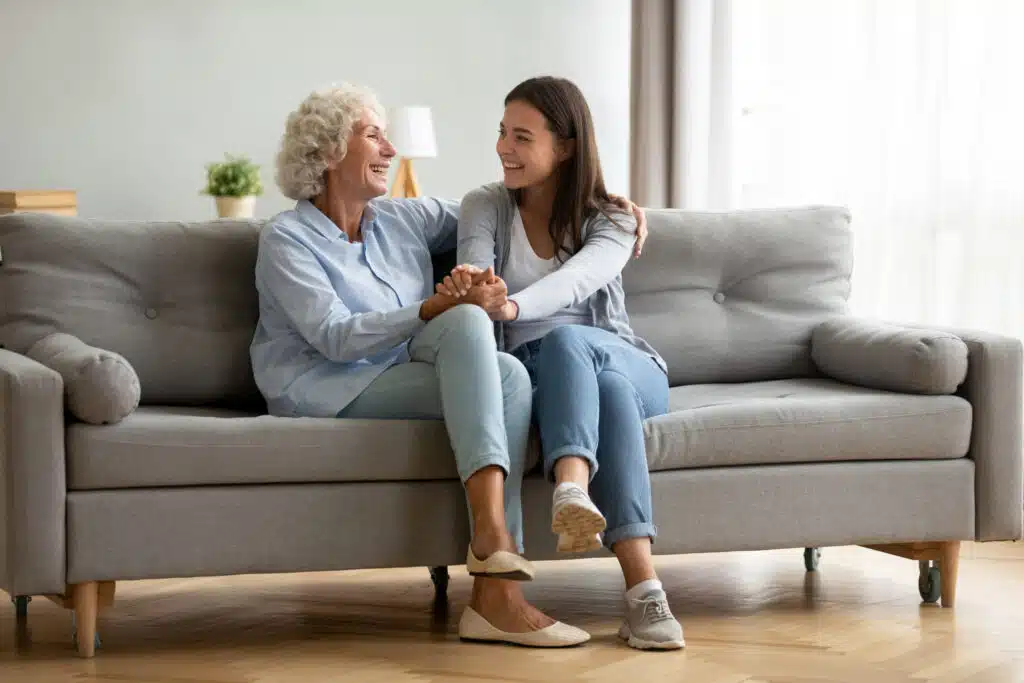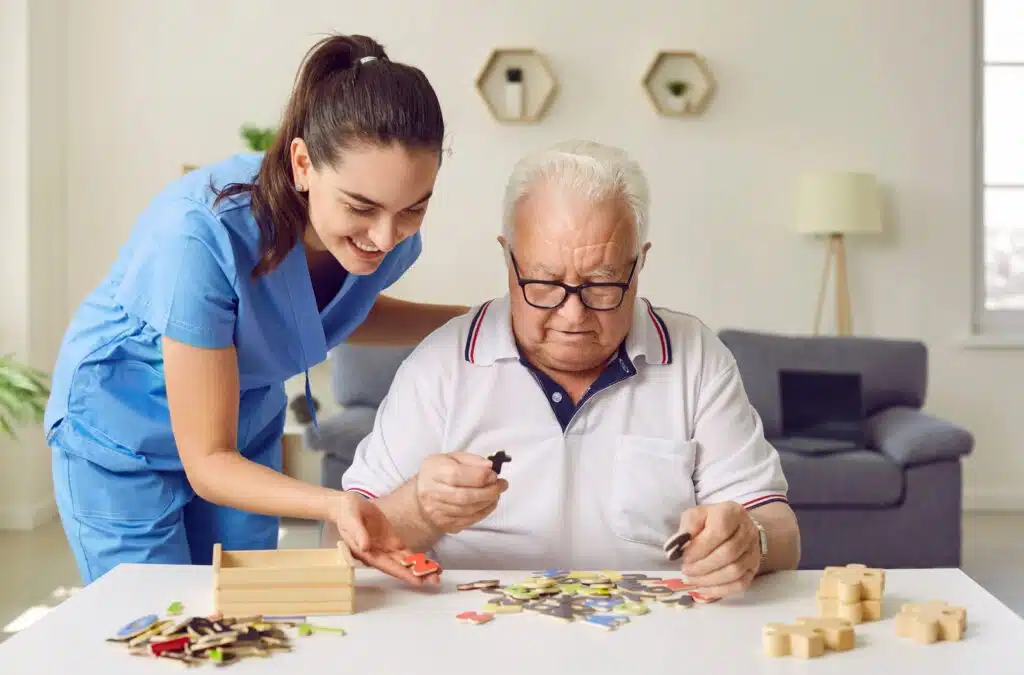
When older adults advance in years, relatives must make vital choices regarding support plans that will most benefit their family members’ health, self-reliance, and overall existence. Two main choices—full-time home assistance and senior living centers—present separate methods, and grasping the contrasts is very important. Although senior centers deliver a shared setting with organized programs, in-home care enables elderly people to stay at their residence while obtaining custom, continuous attention.
This blog explores the numerous benefits of live-in care, highlighting why aging in place can be a superior choice for seniors and their families.
Quick Side-by-Side Review
| Element | In-Home Support | Senior Centers |
|
Residential Setting |
Known personal space |
Shared, unfamiliar residential area |
|
Assistant Focus |
Exclusive individual custom service |
Workers divided between many people |
|
Everyday Schedule |
Adaptable, client-set timetable |
Rigid, institution-fixed timetable |
|
Community Contact |
Custom friendship, social involvement |
Shared functions and collective gatherings |
|
Price |
Often proves affordable, mainly for partners |
Set expenses, potential extra charges |
|
Autonomy |
Significant degree of freedom |
Certain reduction in self-determination |
|
Flexibility in Support |
Support programs adjust to shifting demands |
Restricted options for service tailoring |
Grasping the Choices
Full-Time Home Support
In-home assistance offers a custom answer where a helper lives at the client’s residence, providing individualized attention throughout the day. Assistants help with necessary duties including:
-
Daily cleanliness
-
Food cooking
-
Movement
-
Friendship
The appeal of live-in care lies in its focus on individualized attention. Unlike care settings that require seniors to conform to pre-set schedules, live-in care adapts to the person’s unique needs and preferences.
As an illustration, a helper could:
-
Assist an elder in making their preferred morning meal daily
-
Confirm prescriptions are consumed at the proper moment
-
Join the client for a stroll through the yard
Beyond just bodily assistance, home assistants offer mental aid, cultivating a bond founded upon confidence and friendship. This depth of interaction is extremely helpful for older people who could potentially feel alone.
Home support works best when relatives must:
-
Ensure personalized, one-on-one support that adapts to a senior’s unique needs and schedule.
-
Maintain the comfort and familiarity of home while receiving professional care.
-
Preserve a senior’s independence and autonomy by allowing them to set their own daily routine.
-
Provide companionship and emotional well-being through a consistent caregiver relationship.
-
Customize care levels over time, scaling up or down as health needs change.
Senior Centers Explained
Residential centers, conversely, present a shared lifestyle arrangement created for older people who require certain help yet want to stay community involved. Such locations generally feature:
-
Individual or shared living quarters
-
Availability of group dining, planned events
-
Different degrees of health aid
While this environment can be beneficial for those who enjoy group activities and social engagement, it often requires significant adjustments. Seniors must leave their familiar surroundings and adapt to:
-
Fresh habits
-
Common areas
-
Dealing with unknown workers and occupants.
For people who cherish solitude, self-determination, or the ease of their residence, this move may seem daunting.
Residential centers could be more suitable when relatives require the following:
-
Ensure access to structured group activities and a socially engaging community setting.
-
Provide care in a shared setting with on-site medical support available.
-
Accommodate seniors who prefer a structured daily routine rather than a flexible home environment.
-
Simplify daily responsibilities, as meals, housekeeping, and activities are typically provided.
Primary Advantages of Remaining at Home with Full-Time Support

Ease and Known Surroundings
Home is more than just a physical space—it is a source of emotional security. Remaining in a familiar environment surrounded by cherished memories, personal belongings, and day and night routines can significantly enhance a senior’s quality of life. This is especially true for individuals with cognitive challenges such as dementia, where familiar surroundings help reduce confusion and anxiety.
For instance, imagine an elder who lived many years in their own house, establishing habits such as sipping tea in a preferred seat or hearing a particular broadcast show each night. These minor yet important customs offer a feeling of constancy that is impossible to duplicate in an unfamiliar location.
Through remaining at home, older adults also stay linked to their local area and social group, keeping bonds with close companions, people next door, and regional companies. This consistency is able to cause a major effect on mental comfort and general contentment.
Home assistance offers ease and known surroundings through:
-
Minimizing stress and anxiety by keeping seniors in a familiar and comfortable environment.
-
Preserving daily routines and cherished traditions, fostering a sense of normalcy.
-
Supporting cognitive health, particularly for individuals with dementia or memory challenges.
-
Encouraging community engagement by allowing seniors to stay connected with neighbours, friends, and local organizations.
-
Reducing relocation trauma, preventing the emotional and physical strain of moving to an unfamiliar setting.
Customized Support

A key distinction between live-in care and retirement homes is the level of personalization. In live-in care, every aspect of support is tailored to the individual’s specific needs and preferences. Caregivers take the time to understand not only the physical requirements of the senior but also their hobbies, routines, and personality.
For example, an assistant could cook food following nutritional limits while including the older person’s most liked dishes, or they might organize the hours based on things the client likes, for instance, yard work or sewing. This type of exclusive focus is seldom achievable in residential centers, since workers must attend to the demands of numerous occupants.
The adaptability of home support further implies that the service program may shift as the elder’s requirements develop. Regardless of moving from periodic help to continuous support or managing fresh medical issues, in-home assistance is created to be flexible.
Home assistance guarantees custom focus through:
-
Adjusting support for an elder’s particular health, mental, and community requirements.
-
Providing flexible care plans that can evolve as health conditions change.
-
Accommodating dietary preferences and restrictions, ensuring meals are enjoyable and nutritious.
-
Allowing seniors to continue their favourite activities and hobbies without institutional limitations.
-
Offering focused, one-on-one attention, ensuring caregivers truly understand the senior’s needs and preferences.
Freedom and Self-Reliance
One of the most significant advantages of live-in care is its ability to preserve a senior’s independence. Unlike retirement homes, where daily schedules are often dictated by communal routines, live-in care allows seniors to maintain control over their lives.
For instance, an elder may choose the hour they rise, the food they consume, and the way they pass their time. They are also able to keep up with interests, meet with companions, or take trips to their preferred locations with the help of their assistants. This liberty to make decisions encourages a feeling of worth and individual strength, which is vital for mental comfort.
Home assistance encourages freedom and self-reliance through:
-
Allowing seniors to make decisions about their daily routines and activities.
-
Providing support without imposing restrictions, enabling them to live life on their own terms.
-
Helping maintain social connections, ensuring seniors continue to see family and friends as they choose.
-
Encouraging engagement in hobbies and personal interests, from gardening to reading to cooking.
-
Keeping couples together, avoiding separation due to different levels of required care.
Price Analysis
While live-in care may initially seem more expensive than retirement homes, a closer look often reveals that it can be a more economical option in certain scenarios. For couples, live-in care is particularly cost-effective, as both individuals can receive care in their shared home without incurring separate fees.
Furthermore, in-home support removes the expenses connected with transferring to a residential center, including moving charges, facility admission payments, and the requirement to decorate a fresh area. Relatives may also adjust the amount of assistance to fit their finances, selecting either continuous or limited home services based on their family member’s requirements.
Home assistance presents budget-friendly answers through:
-
Avoiding the high costs of moving into a retirement home, including entrance fees and downsizing expenses.
-
Providing care for both partners in a couple, making it a more affordable option than two separate care fees.
-
Offering flexible care plans, allowing families to customize services based on their budget.
-
Reducing unexpected expenses, such as additional fees for specialized care in a retirement facility.
-
Preserving home ownership and assets, allowing families to maintain long-term financial stability.
Issues with Residential Centers
Residential centers offer organization and community chances, yet they also include significant difficulties which could render them inappropriate for some older people.
Reduction of Private Area
The move to a residential center usually requires reducing possessions and adapting to common areas. Numerous older people struggle to abandon the solitude and ease of their residence, and collective life might seem confining. Using dining halls, leisure spots, and occasionally even restrooms together can cause unease or a feeling of being invaded.
Restricted Personal Focus
In retirement homes, staff are responsible for multiple residents, which can result in limited individual attention. This generalized approach may leave some seniors feeling neglected, particularly if they have specific medical or emotional needs that require consistent oversight.
Adapting to Fresh Settings
Leaving a long-time home for a new, unfamiliar environment can be emotionally challenging for seniors. They may experience feelings of loss, anxiety, or isolation as they adapt to new routines and surroundings. This adjustment is especially difficult for individuals with cognitive impairments, who may struggle to navigate the change.
Further Benefits of Full-Time Home Support

Assistant Matching
One of the most unique aspects of live-in care is the ability to match caregivers with seniors based on compatibility. Care agencies, like Assurance, prioritize pairing caregivers and seniors who share similar interests, values, and communication styles. This thoughtful approach ensures a positive and harmonious relationship, which is essential for creating a supportive environment.
For instance, an assistant fond of horticulture may connect with an elder through cultivating flowers, whereas a helper who likes to read might exchange novels and participate in talks regarding written works. These mutual pursuits encourage significant bonds that extend past simple assistance duties.
Adaptable Support Programs
Different from the rigid timetables of residential centers, in-home support provides a degree of adaptability that adjusts to an older person’s specific and changing requirements. Relatives are able to select the length and strength of assistance, ranging from temporary help following an operation to permanent, continuous support for persistent illnesses.
This flexibility guarantees that older people obtain the correct amount of assistance throughout their journey, making in-home support a responsive and enduring option.
Community at Residence
A common misconception is that seniors who age at home may feel isolated. However, live-in care actively supports social engagement. Caregivers provide companionship, facilitate visits with friends and family, and help seniors participate in community activities.
As an example, an assistant could join an elder at their neighborhood card group or help them use devices to video call with far-off family members. These minor yet significant exchanges support older people in keeping their community links and mental comfort.
Expert Support for Persistent Illnesses
Older people with long-term medical issues frequently need expert attention which residential centers might find hard to deliver. Full-time assistants are educated to handle various ailments, including blood sugar problems and joint inflammation to Parkinson's sickness and memory loss.
For instance, an assistant could check glucose readings, help with walking devices, or establish a secure setting to avoid accidents. This degree of custom attention guarantees that elders may live securely and easily within their personal residences.
Addressing Misconceptions Regarding Home Support
In spite of its advantages, false ideas concerning in-home support frequently discourage relatives from exploring this choice. We will discuss several popular fables:
“Full-time assistance costs too much.”
Although home support might appear expensive, it proves cheaper than residential centers, particularly for partners or individuals with distinct requirements.
“Assistants are untrained.”
Expert helpers are very capable and educated to handle health, mental, and everyday requirements.
“Older people become isolated in their residence.”
Caregivers provide companionship and support, helping seniors maintain an active social life.
“Full-time support is exclusively for people with serious medical problems.”
Many people assume that live-in care is only necessary for individuals with serious medical conditions. In reality, live-in care is for anyone who wants support with daily activities, companionship<, or simply the peace of mind that help is always available. It can be a preventative solution that enhances independence rather than a last resort.
“Relatives might surrender authority concerning their family member’s support.”
A few people fear that employing an expert assistant signifies giving up power over their family member’s health. Yet, in-home support encourages a cooperative method, where relatives stay deeply engaged in making choices and partner with helpers to guarantee their loved one obtains the highest quality assistance available.
“Residential assistance is not as secure as a senior center.”
Many believe that seniors are safer in retirement homes due to on-site staff and emergency response systems. However, 24/7 care provides one-on-one supervision, reducing fall risks, ensuring medications are taken correctly, and providing immediate assistance in emergencies—often making it a safer option than institutional settings.
How Remaining at Home Matches Older People’s Desires
The majority of older people state a wish to stay within their personal residences as they grow older. This choice originates from the ease, self-reliance, and mental bond that living at home offers. A residence is a foundation of known surroundings and safety, and being there permits elders to keep their sense of self and daily habits.
For relatives, backing a family member’s desire to remain at home may offer mental tranquility, understanding that they are assisting their cherished person in having a satisfying and respectable existence.
The Essence of Residence
In-home support presents a kind, custom, and adaptable answer for older people who want to live at their residence. Through mixing useful assistance with mental bonding, it enables clients to stay self-reliant and at ease in their personal houses while getting the help they require.
For relatives searching for the finest support choice for their family members, in-home assistance delivers unmatched benefits.
Want to see if live-in care is right for your loved one? Get in touch with our team today.
Regarding The Writer
Marcus Thorne
Marcus Thorne commits himself to reshaping older adult support as the President and originator of Dedicated Residence Assistance. His strong desire for improving the standard of living for elders lies at the core of the organization’s purpose, which centers on promoting remaining at home via kind, individualized attention. Possessing a varied history covering audio, living, and amusement, Marcus contributes a special combination of imagination and tactical understanding to the medical field. His talent for new ideas, client satisfaction, and comprehensive promotion has reliably resulted in outstanding achievements, establishing him as an energetic figure who is changing the method support is given.
